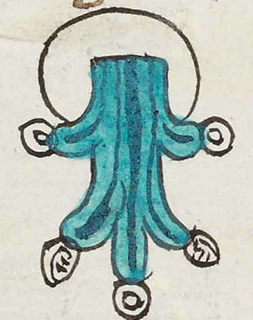Ameyalco (Mdz32r)
This simplex glyph stands for the place name Ameyalco. It is a natural spring (ameyalli). The locative suffix -co is not shown visually. The water flows downward with droplets/beads and turbinate shells splashing off the flow. It is colored turquoise blue. It springs from a black line circle. The bottom of the circle is obscured by the flow. The locative suffix -co is not shown visually.
Stephanie Wood
Frances Berdan and Patricia Anawalt point out that the word ameyalli derives from the verb meya (to flow), which Frances Karttunen also recognizes. The Codex Mendoza has another very similar glyph for Ameyalco on folio 22 recto. In that one, the circular hole in the earth from which the water springs is somewhat larger, and the droplets and shells that are at the water's tips are in a different order. But, otherwise, the two glyphs are strikingly similar, probably made by the same artist/writer. The water (atl) in this ameyalli has the usual thick and thin black lines to indicate currents. Today there is a San Miguel Ameyalco in the state of Mexico, near Lerma, in the valley of Toluca. Towns of the same name but with a slightly different spelling (Amealco) are found in the states of Guerrero and Querétaro.
Stephanie Wood
ameyalco. puo
Ameyalco, pueblo
Stephanie Wood
c. 1541, or by 1553 at the latest
Stephanie Wood
springs, water, flow, shells, nombres de lugares

a(tl) or ā(tl), water, https://nahuatl.wired-humanities.org/content/atl
ameyal(li) or āmēyal(li), a natural spring, https://nahuatl.wired-humanities.org/content/ameyalli
meya or mēya, to flow, https://nahuatl.wired-humanities.org/content/meya
-co (locative), https://nahuatl.wired-humanities.org/content/co
"On the Spring" (Berdan & Anawalt, v. 1, p. 171)
Amēyal-co = "Donde brota el agua"
Miguel León-Portilla, "Los nombres de lugar en náhuatl," Estudios de Cultura Náhuatl 15 (1982), 42.
Codex Mendoza, folio 32 recto, https://digital.bodleian.ox.ac.uk/objects/2fea788e-2aa2-4f08-b6d9-648c00..., image 74 of 188.
The Bodleian Libraries, University of Oxford, hold the original manuscript, the MS. Arch. Selden. A. 1. This image is published here under the UK Creative Commons, “Attribution-NonCommercial-ShareAlike 3.0 License” (CC-BY-NC-SA 3.0).



